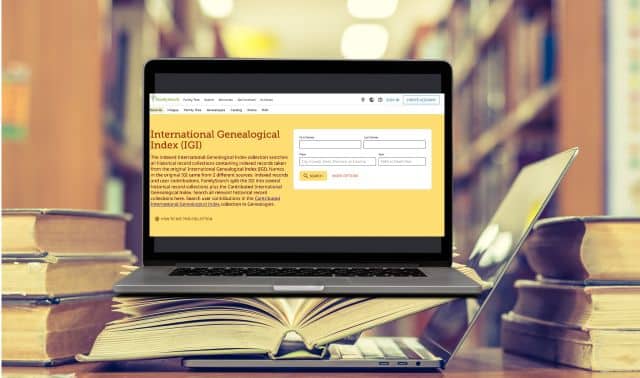Sign up for the Family Tree Newsletter! Plus, you’ll receive our 10 Essential Genealogy Research Forms PDF as a special thank you.
Get Your Free Genealogy Forms
"*" indicates required fields

It used to be that attending some meetings of a local genealogical society, posting a few queries on message boards, or maybe running into a fellow researcher at the library was enough to stay connected to other genealogists.
While some of those techniques still work, new options abound: You now can post genealogy queries and news on Facebook, you can connect with other researchers virtually by attending an online class, or you can volunteer your skills and services to give back to the family history community. With the following seven methods for tapping into the genealogy community, you’ll be surprised how easy it is to meet new people, interact with like-minded individuals, and exchange genealogy tips and ideas.
1. Join a genealogical society.
One of the easiest ways to meet fellow researchers is by joining a genealogical society. Most of these groups have monthly meetings in public spaces such as libraries, town halls or churches. Many have events and even organize research trips. Not sure about becoming a member? Go to a few meetings and interact with other family historians. Soon you’ll find you’re in good company with many new genealogy friends who will love to hear about your research triumphs and your brick walls. Check with your local library or research center, or try internet searches for your county name plus genealogy society or historical society or your state name plus genealogy society to find organizations in your own backyard.
But don’t limit yourself to just local societies. Did you know that some regional societies, such as the American Ancestors, allow you to join online and offer special members-only databases and discounts? Cyndi’s List has a comprehensive listing of societies and groups including national, ethnic, lineage and religious organizations.
Tip: Can’t find a local genealogical society? Try joining the local historical society and see about starting a genealogy subgroup. Or start your own society.
2. Start a genealogy blog.
Have you ever wanted to place your research, family photos and stories about your family’s history on a website? Did you think it was too difficult to do or that no one would really be interested?
A blog is a website that serves as an online journal for individuals. You can “post” information to a blog as you would write in a diary or newsletter. Posts can contain information on a genealogy event, photos or a recent find during a genealogy research trip.
A blog is easier to create and maintain than a website because many free hosting sites will let you register and then customize the look of your blog.
What is it like to run a genealogy blog? Ask any of the thousands of genealogy bloggers and they’ll tell you not only how rewarding it is to document your own family history, but also how much fun it is to interact with a community of fellow genealogy fanatics. If you’re ready to take the plunge, it’s easy to create and maintain a genealogy blog.
First, choose your focus by asking yourself what you want to accomplish. Second, find well-formatted blogs that you enjoy reading. Use these as examples when setting up your own blog. Then select a blog name and choose your blogging platform. For ease-of-use, you can’t do better than Blogger or WordPress, where you can create a blog within five minutes.
Tip: Reading others’ blogs — and commenting on posts when you have something to say — also can hook you into the genealogy community. Use Google to find other genealogy blogs or visit GeneaBloggers and check out the list of more than 1,300 blogs.
3. Go to a genealogy conference.
Nothing can get you more connected to other family historians than a genealogy conference. Whether attending close to home or across the country (or even on another continent), there’s a certain energy and a vibe that can’t be replicated online. So what’s the process for attending a genealogy conference or expo?
- Locate a conference. Find an event that interests you and is relevant to your area of research.
- Plan your travel. Make sure you factor in airfare or other transportation and accommodations.
- Reserve your spot. Register for the conference by using the conference website, or by phone or mail. Most genealogy conferences offer a nice discount for early-bird registration. Plan ahead and register before the deadline, and you can use those saved pennies for your travel expenses or spend them in the vendor hall.
- Plan research activities. Make a list of places where you’d like to conduct research while in the city that’s hosting the conference. Include libraries and archives, but don’t forget churches, courthouses and cemeteries.
Most attendees will tell you a genealogy conference is like heaven — if heaven were filled with people who share your family history passion. Conferences not only provide educational workshops, but also may offer dinners, historical tours, trips to research facilities and other social events.
Tip: Print genealogy “business cards” with your contact information on the front and your surnames or research information on the back. You can quickly connect with other genealogists by handing them your card.
4. Get on Facebook.
Facebook, the largest social networking site, has billions of members worldwide. And you probably already know how Facebook is a wonderful way to interact with people, as well as how it can be a waste of time or a nightmare, in terms of keeping the information you post private. But set aside all that and consider visiting a site where you could:
- Meet other researchers working on your family lines.
- Join an online genealogy group dedicated to a specific surname or ethnicity.
- Share research resources and brick wall strategies with experienced genealogists.
- Get recommendations on genealogy books and software.
- Locate long-lost cousins or find living relatives you didn’t even know existed.
If you could do all this from the comfort of your home on your computer, wouldn’t you at least want to check it out? Although Facebook may seem like it’s only fun and games, if you take a focused approach, you can harness its best features for your genealogy.
Facebook can be a daunting landscape to navigate, especially for beginners. But any genealogist on Facebook will tell you the rewards are many and the risks can easily be managed by staying informed. Follow these tips to get the most out of your Facebook experience while protecting your privacy:
- Read the terms of service. This is an important practice for any website where you provide personal information whether the information will be shared or not.
- Check your privacy settings. Don’t let Facebook assume how much privacy you want. A simple fix is to click Account (in the upper right corner), then Privacy Settings and set everything to Friends Only.
- Are you really my friend? Scrutinize Facebook friend requests. If in doubt, click Send Message in the friend request form and ask how the person knows you and why he wants to be your friend.
- Keep personal information on a “need to know” basis. Just because Facebook asks for information, such as your birth year, doesn’t mean you have to provide it. The same goes for email addresses and phone numbers.
Tip: When you’re out there on social networks, the best way to stay focused on genealogy is to seek out other genealogists and become their Facebook friends. Also include the words genealogy and family history in your bio.
5. Give back to the genealogy community.
If you’ve spent years tracking down your ancestors using free, volunteer-created resources, consider returning the favor. Interact with fellow genealogists by contributing to a variety of projects, such as:
- Find A Grave: Become a volunteer and index a local cemetery. Or offer to take photos of grave markers for those making requests.
- FamilySearch: Join hundreds of thousands of users through the megawebsite’s Get Involved opportunities. Help index historical records from around the world and verify place names.
- Random Acts of Genealogical Kindness: Volunteer to do lookups for those without access to the records that are close to you.
- Unclaimed Persons: Assist local and county medical examiners across the country as they try to locate living next of kin of the deceased. Your online genealogical sleuthing skills could help bring much needed closure to these families.
6. Publish your research.
Publishing your research in a book can get your relatives interested in your family history and help you find other genealogists with research interests similar to yours. There’s no need to spend months putting together your opus, either. Computer and internet-based publishing let anyone to create a book with photos — in electronic or printed format — in a matter of hours. Many genealogists use websites such as Blurb or Lulu to make family history books. You can sell your book through these websites, too.
Want to go another route? Try writing up some family stories, scanning related records and images, and starting a family history website.
Tip: Even genealogy bloggers are getting in on the publishing act: Several have compiled their best blog posts into e-books and printed volumes for sale at their websites.
7. Attend genealogy classes and workshops.
Many organizations offer the chance to learn about genealogy through classes and workshops. While you can attend some sessions online, it doesn’t mean you’re on your own. The following options let you interact and chat with others in a fun learning environment:
- Attend online classes: Take advantage of educational opportunities from the convenience of your computer. Visit our own Family Tree University to check out upcoming courses. Offerings include creating a family history website, working with digital photos and writing a family book, among others.
- Visit your public library or community college: You can find a variety of genealogy- or history-related courses to attend in person. Also check for classes at venues such as genealogical societies and religious centers.
- Take in-depth courses: ProGen study groups offer lots of interaction among participants in an online classroom and requires an 12-month commitment. Boston University offers its Certificate in Genealogical Research program in a 15-week course.
Tip: Play teacher instead of student by offering to teach a genealogy class at your local library or senior center. You’ll not only find the experience rewarding, but you’ll also get a chance to meet other genealogy folks.
Our ancestors knew it wasn’t beneficial to lead a solitary life — as much as one needed food for sustenance, one also needed interaction with others. It’s easier and easier these days to pursue your genealogy research in a vacuum by working online and keeping your head down in the records when you venture to the library. But you’ll find countless social opportunities in the genealogy community if you look close enough. Most are free and only require that you make the first move to be part of that community. And once you act, you’ll wonder why you didn’t do so sooner.
Tip: Going to a genealogy conference, class or society meeting for the first time? Bring business-style cards stating your name and email address, as well as surnames you’re searching and the places those families lived.
A version of this article originally appeared in the January 2011 issue of Family Tree Magazine. Last updated: November 2024



